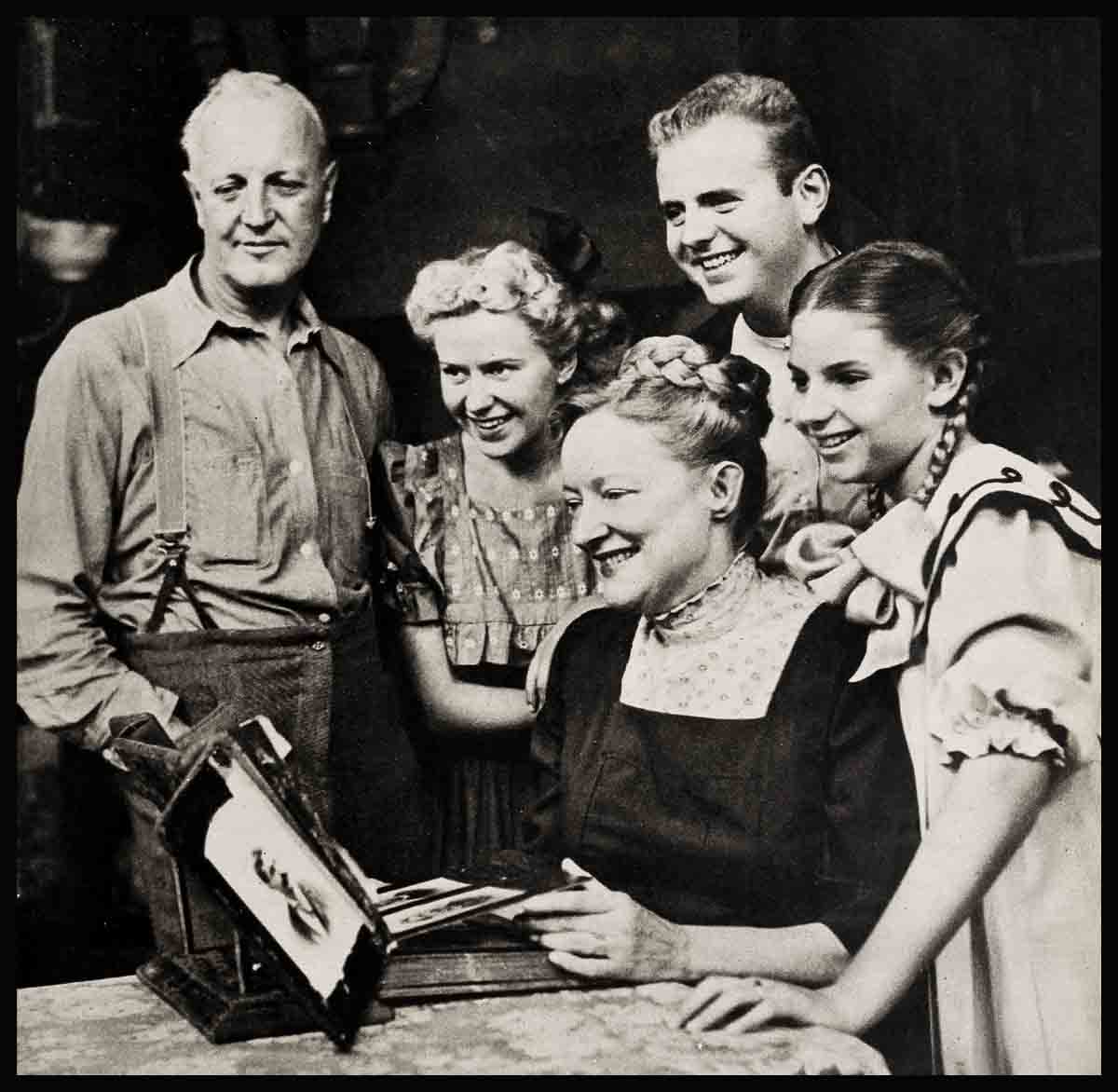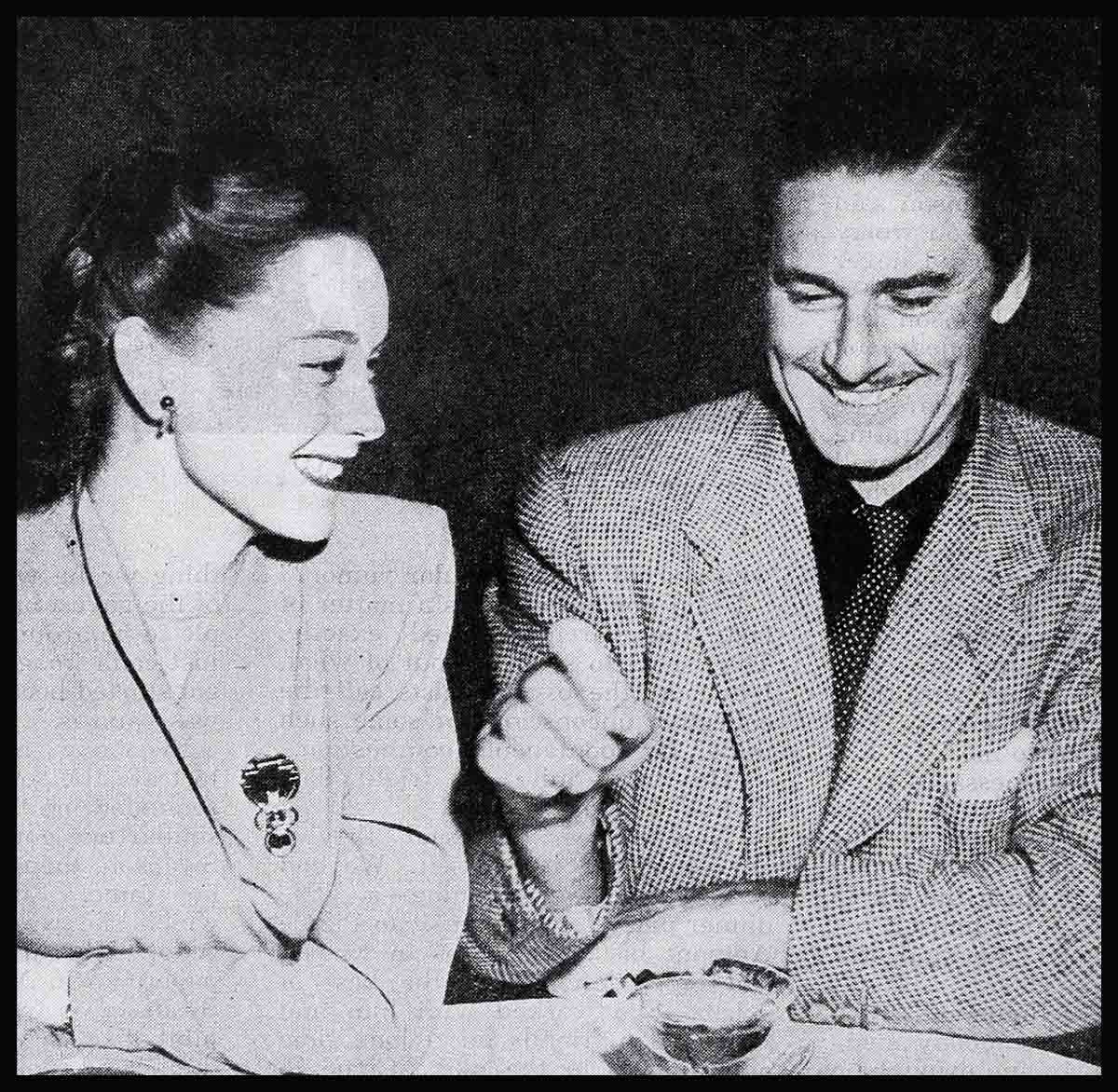
Does Mother Always Know Best?—Peggy Wood
“Sometimes I wonder if Mother always knows best. When I look at today’s younger generation, I am greatly encouraged by what I see. Today’s moral standards are just as high as they were in my day—and the worst that can be said of the youth of our time is that, perhaps, it is growing up too fast.”
These are the words of actress Peggy Wood, whose own personality reflects the blend of comedy, subtle humor, deep sentiment and reality in the title role she so eloquently plays in CBS-TV’s “Mama” series.
“I don’t know if Mother always knows best,” she goes on, “because everything has changed so much in the past fifty years that the parent is often as bewildered as the child. Fifty years ago there was a slow-paced pattern of life that hadn’t changed much in a long while, and it was quite possible for Mother always to know better.
“Of course, I think there is a great difference between he young people of my day and now, because there was more family life then,” says Miss Wood. “There weren’t so many outside diversions such as the movies, TV, cars, to take the family away from the home. Consequently, Mother held a firmer—and perhaps more guiding hand.”
This actress is of the opinion, despite the role she plays in TV, that the mother who thinks she is infinitely wise and always right, gains little ground. Mother probably knows best from her own experience because she’s older and is aware of similarity to cases she’s either experienced or heard about. She has a collection of facts to go on.
“I think Mother often knows best by knowing when to keep her mouth shut and let her child learn by experience. The child expects a certain amount of protection, but it doesn’t want to be smothered. The older generation should not dictate, but cooperate with the younger generation,” says Miss Wood.

She agrees with the opinions of leading educators and child psychologists when she claims that there’s a limit to Mother knowing best. Once the young adolescent starts standing on his own feet, then Mama had better get out of the way. The age when that can happen is flexible, and occurs whenever the child shows signs of maturity.
A mother can sometimes—or often—be wrong, and she should have the courage to admit it, believes Miss Wood. It will only make a fool of her in everyone else’s eyes—including the youngsters concerned—if she sticks to her pronouncement through stubbornness.
Mama knows more than the younger crowd in her experience with people. The youngsters are likely to be taken in by people. Nevertheless, the instinctive evaluation of youth may be very sound, but it depends upon their age. On the other hand, children know more about people of their own age, because Mama has forgotten how she felt when she was young. Any adult forgets part of the exact feelings he had as a child.
“Take, for instance, the little girl Dagmar in our show,” says Peggy Wood. “She has less evaluation of people at the age of 11 than when she grows a little older. This is especially true of girls who, when they reach the ripe old age of 16, don’t believe Mother knows anything at all. Yet, that’s standard in every family, without relation to the earning power or walk of life of the family. It’s a kind of growing-up thing.”
Proof that such statements make sense, and that Miss Wood (herself a mother and grandmother) is something of an authority when it comes to whether Mother knows best, lies in the standing of “Mama,” one of the nation’s most popular TV shows. Climbing from program obscurity in just four years to the top ten in national ratings, it gets 19,800,000 viewers each week.

If you haven’t caught “Mama” yourself, it is the warm, wistful and wonderful story of Norwegian-born Marta and Lars Hanson who emigrated to San Francisco at the turn of the century, and their youngsters—teen-agers Nels’ and Katrin, and 11-year-old Dagmar.
Each week, the show features an episode that could take place today in the home of any American family. Mama herself may be faced with Katrin’s first love affair, Papa’s loss of a job, Nels’ jubilation at the prospect of being captain of the basketball team and then his despondency when he doesn’t win, or Dagmar’s mischievous antics that lead to trouble with the neighbors.
But whatever the episode, or the incident, it is always Mama who really knows best. For instance, in one of the shows, Katrin goes through a phase of wanting to know only important people. She believes that importance is measured only by money and success in career. Mama tries to convince her that Papa is a success, despite not being wealthy.
It starts when Katrin says proudly of the boy who’s taking her to the Senior Prom. “Oh, Mama, he isn’t a boy! He’s captain of the basketball team and advertising manager of the yearbook, and the Seniors are going to elect him president!”
“Is that why you’ve been seeing so much of him lately?” asks Nels.
“Well,” exclaims Katrin, “you don’t think I’d throw my life away on anybody who wasn’t going to be somebody,do you?”
Katrin is even more shocked when Papa loses out on a small building contract, and tells Mama that her father will never amount to anything. But when Jerry Winters, the boy who was taking her to the Prom, does lose the election for president, she sees everything in a new light, and the whole situation resolves itself satisfactorily.

Thus, Katrin learns through her own experience that Mama is right. She does know best, after all.
Travelling a long and lustrous road in show business, Peggy Wood has appeared, and mostly been starred, in sixty shows. Her father, newspaperman Eugene Wood, had his eye on the “Met” for his only daughter when she was just four years old. Later, she studied voice under the celebrated Emma Calve, the greatest Carmen the opera world has ever known.
But a career in opera was not to be. Peggy was 18 when she joined the chorus of “Naughty Marietta,” at the handsome salary (for those days) of $20 a week. Six years later, Broadway saw her in the memorable “Maytime,” and her career in light opera rather than in grand opera was assured.
Peggy Wood reached the peak of her career in two Noel Coward hits, “Bitter Sweet” and “Blithe Spirit,” and Hollywood claimed her for leading roles with Joan Bennett, Ginger Rogers, and Barbara Stanwyck. Her last screen appearance was with Betty Hutton in “Dream Girl.”
Today, Peggy Wood is no longer surprised that she is so completely identified with her successful TV role of Mama. Hardly a day passes when she leaves her Manhattan house, or her Stamford, Connecticut, country home, that she isn’t hailed on the street by some passing youngsters.
A fan may shout to her, “Where’s Dagmar?” Another, “Hi, Mama!” But sometimes it worries her a little that people believe she is truly the character she plays for the TV screens, and in private life is a simple Norwegian mother who can solve the problems of one and all. Strangers are constantly amazed, even shocked, that she shows not a trace of her TV accent!
People are constantly writing in to Mama to come to the rescue, because “Mama knows best.” One of the most touching letters she received was from a woman who lived with her large family in one room near the railroad tracks.
“She had enormous problems,” says the real-life Peggy Wood, “and she wrote that she wished I could just come up and see her, and she was sure I’d be able to straighten everything out.”
Another very touching letter came from the mother of a little boy in a New York hospital with a rare blood disease. “She didn’t ask for my time, or money, or any favors whatsoever. All she wanted was, ‘Please send my little boy your prayers.’ ”
With all their hearts, the entire cast of “Mama” did just that. The bulk of the voluminous mail Peggy Wood receives comes mostly from grateful parents. They say they can get a little more cooperation from their children by exclaiming, “You don’t think that Dagmar or Nels would do that!”
That the show is accepted more than a little seriously is evident by the following incident. After one week’s episode that dealt with the teen-age practice of borrowing things back and forth, letters poured in asking if she wouldn’t have the material on the program mimeographed and distributed to parents’ groups around the country. It was.
What is most lacking in the younger generation, Peggy Wood feels, is a general acceptance and understanding of the act of courtesy. “I’d advise young people today to show more courtesy, because through courtesy and consideration for others, you learn to get along with other people. I don’t think youth should bow to mere age, but be courteous to all ages, and in so doing become a better citizen.
“Courtesy in today’s young crowds depends entirely on how they were brought up,” she goes on. “If they have never been exposed to courtesy and consideration for others in their own home, naturally they won’t have it outside.”
Peggy Wood would like to see the new generation take a little more care of its deportment. And, she adds, Mother’s duty to “know best” a good part of the time is most needed when the child is young. Despite the rule of self-expression, a small child isn’t entirely ready to make all its own decisions. There are many times when it needs and wanis someone older and wiser to give it reassurance in making decisions.
“A child has to feel that what mother does is right and good. Nothing is so frightening to a child as finding out Mother isn’t right or good.”
The star of CBS-TV’s “Mama” feels, however, that there is more need for Mama’s guidance now than ever before. She thinks the children of today are so much more insecure, with two wars behind them and heaven knows what ahead. All of which makes them uneasy, wayward, and often rebellious. Were they to feel that there was even one place that was safe and steady and filled with love, they would get on better with what they have to face outside. As it is, they have known nothing in their backgrounds but insecurity.
“Still, there are other compensations,” reveals TV’s understanding mother of three. “The youthful generation of just yesterday missed a lot by not knowing how to sew, cook, knit, or be machine-minded and handy with tools. Today’s youth is different and wants very much to know how to do these things. And do you notice how women have changed? It is no longer fashionable or chic for a woman to make a darned fool of herself by saying, ‘I can’t even boil water.’ ”
As an example, Miss Wood mentions Dagmar who loves to sew and knit and adores cooking. “While they teach cooking and sewing in school,” explains Dagmar’s TV mother, “I don’t think those are really school subjects, but good things to have around a house. Youngsters always imitate, and when Mama starts cooking and making pretty clothes, they want to copy that right away. And that is happening now everywhere in America.
“Today,” says Peggy Wood with a touch of satisfaction that is more characteristic of the simple TV Mama than the svelte, sophisticated actress, “there is currently a rediscovery of the home and the dignity of its work. And that is why I have great hopes for—and faith in—the new and younger generation.”
THE END
—BY VINCENT ROGERS
It is a quote. SCREENLAND MAGAZINE JULY 1953





No Comments